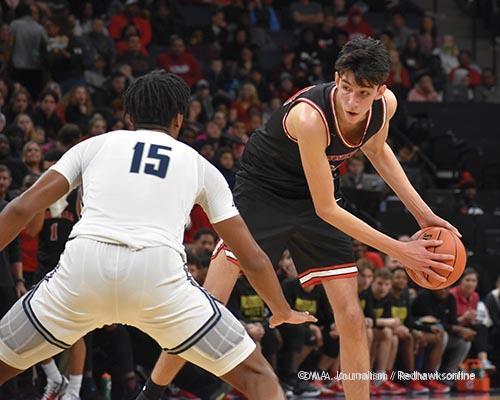Young athletes profit
Larry McKenzie, the Minneapolis North boys basketball coach, spent 42 years training high school athletes. Over his lengthy career-which included several games against the Minnehaha Academy Redhawks-McKenzie secured a record six state championship titles. Nonetheless, the Minnesota Basketball Coaches Hall of Fame member announced in July that he’s decided to “hang up the whistle”.
The news came less than one month after the Minnesota State High School League (MSHSL) approved a policy that authorizes young athletes to profit from the use of their name, image, and likeness (NIL) in company partnerships, product promotions, and more.
“[The new NIL policy] was a big part of my decision-making of getting out,” McKenzie revealed to Minnesota Public Radio. “I personally just think it’s going to create a lot of additional chaos.”
The debate surrounding student-athletes and NIL first started at the college level. In June 2021, the Supreme Court ruled in a unanimous verdict that the NCAA could not restrict the types or amounts of compensation that a student athlete is entitled to.
Since then, the issue has trickled down to younger athletes. Many states have banned high school students from making money in connection to their sport. However, Alaska, California, Colorado, Connecticut, Kansas, Louisiana, Nebraska, New Jersey, New York, Utah, and now Minnesota recently permitted students to benefit financially from NIL without jeopardizing their athletic eligibility.
Following the approval of NIL deals, some prominent young athletes have cashed in considerably on this opportunity. Minnehaha’s own Hercy Miller signed a $2 million contract with technology company Web Apps America during his senior year of high school after committing to play basketball at Tennessee State. If the MSHSL had passed its NIL policy a few years sooner, Miller-as well as Minnehaha star athletes Jalen Suggs and Chet Holmgren-would have undoubtedly signed big-time contracts earlier in their careers.
Nonetheless-despite the financial opportunities NIL provides to high school athletes- many Minnesotans, like McKenzie, have questioned whether this policy bolsters or detracts from the culture of high school sports.
Molly DiNardo-a Minnehaha Academy senior who participates in Cross Country, Nordic Skiing, and Track and Field-does not support high school athletes receiving payment in connection with their sport.
“Why am I not getting paid?” DiNardo joked. “I don’t think high school athletes should get paid. It puts too much pressure on students who already have too much going on…I only support it if I’m the one getting paid!”
Further, a local avid sports fan raises a poignant question about infusing amateur sports with large amounts of money.
“Is introducing lots of money without a plan helpful?” the sports fan questioned. “Some people would say that [NIL] is more fair and equitable-that athletes are getting their fair share-which I get. However, it comes down to the question of if adding significant amounts of money [to amateur sports] is what’s best for people in the long run?”
What does the new policy entail?
Technically, NIL deals do not pay students to play. In fact, if a student receives profits contingent upon athletic performance, they relinquish their eligibility to compete. Instead-like the acronym suggests-NIL deals primarily compensate students for the use of their name, image, and likeness in product endorsements. Additionally, the new MSHSL policy grants students the ability to derive revenue from coaching, selling autographs, and hiring professional representation.
Included in the same policy are several stipulations aimed at protecting the amateur status of high school athletes. The MSHSL declared that payment-or the promise of prospective payment- cannot be used to persuade an
athlete to attend a certain school and, during NIL promotions, students are prohibited from mentioning school involvement. Additionally, an NIL deal must not prompt a student to miss sports practice, competitions, team obligations, or academic commitments.
The MSHSL also maintains that athletes are barred from endorsing gaming, gambling, alcohol, or tobacco companies as well as weapons, cannabis-related products, or items from the school they attend.
What concerns does NIL raise?
According to the MSHSL, the conditions included in their NIL guidelines maintain the amateur status of young athletes. Nonetheless, an anonymous coach at a local private high school anticipates some repercussions from the new policy.
“I would envision that there’s a bunch of things that [the MSHSL] missed that they didn’t realize, but they will realize after they are confronted by it,” voiced the anonymous coach. “I do think that if you use someone’s name, image, or likeness to your benefit that that person should be compensated. So, in theory, I like the idea, but I think [the MSHSL] has opened up a can of worms that they don’t know the consequences yet.”
According to McKenzie, a part of this “can of worms” that the MSHSL has opened up is an increased lack of equity between schools. Wealthier schools will likely receive more NIL deals and, therefore, will attract more high-caliber student-athletes.
Despite the efforts of the MSHSL to prevent recruiting, McKenzie foresees it still happening informally.
“Everybody knows there are already outside influences [in high school sports],” stated McKenzie to MPR. “[NIL] is not intended for [recruiting], but it’s going to happen.”
What is the future of high school athletics?
Ultimately, McKenzie forecasts that- because of NIL-the culture and decision-making behind high school athletics will be forever changed.
“We’re already dealing with who gets the most shots and who gets the most playing time,” McKenzie disclosed. “Now, we’ve gotta deal with who makes the most money?”
Similarly, the anonymous coach is concerned about the spirit of high school athletics straying away from the love of the sport.
“High school has always been really fun for me to coach because kids play [for the love of the sport] and for that reason only,” expressed the coach. “Now, does NIL add another reason for why students have to play? Instead of being passionate about your sport, is it now to make money? That’s kind of sad to me.”

